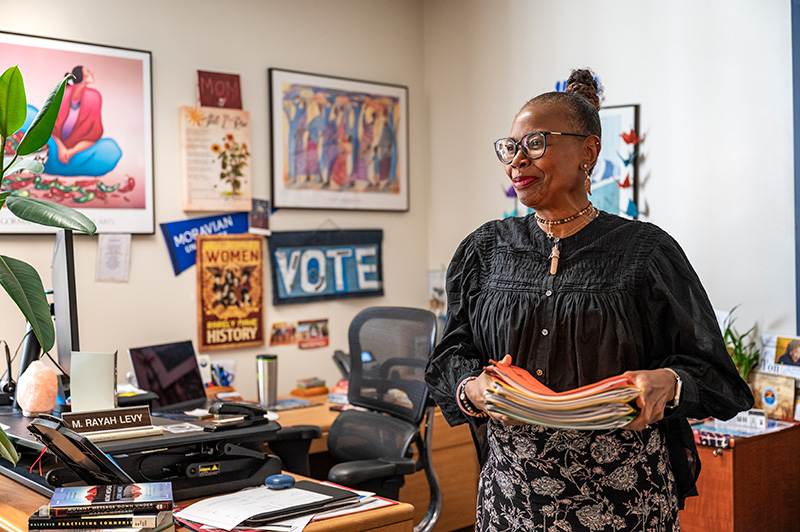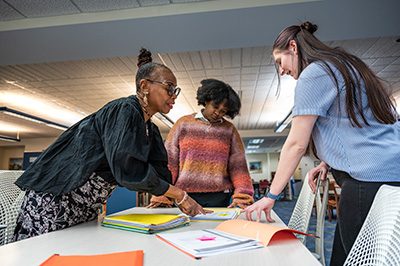
M. Rayah Levy in her office in Reeves Library
I was born on a small island called St. Vincent & the Grenadines. I came to the United States at 11 and grew up in Brooklyn, New York. Both places had a profound impact on my life. They shaped my perception of how I think and respond to the world around me, thus creating a love for cultural diversity.
What is your role at the college and what drew you to this profession?
I am the Public Services and Information Literacy Librarian. My responsibilities include supervising the circulation and interlibrary loan staff. Additionally, I teach students tips and tricks on using our database for their research projects.

After graduating from a non-traditional school, Vermont College, I was drawn to this work. While there, I had to create my courses by submitting a detailed proposal to my advisors. I developed a love for research and writing— it was a cerebral experience! I learned something new each day that required effort, thought, and concentration. Additionally, I was inspired by another librarian, Judy Watts, at Middlebury College. She was also an extended family member who saw I had birthday dinners and knitted my son’s bringing-home-baby outfit. She has since transitioned from this life; however, memories will live on in my career.
I enjoy engaging and meeting with faculty, staff, and students. Being in this space gives me the tools and capacity to remain a life-long learner. Each day, I live vicariously through their eyes.
Of your accomplishments thus far in that role, which is most meaningful to you?
Being allowed to present at the Moravian University event titled Race, Slavery and Land. Moravian Legacies in a Global Context, 1722–2000
What does it mean to you to be recognized by the City of Bethlehem as an African American woman who has made a positive impact in the community?
I’m honored!
Also, I found it ironic to be recognized at the Bethlehem Area Public Library [BAPL], as it was once my home away from home. Working at the BAPL is why I came to know the larger Bethlehem community. Because of that space, I began to call myself a “librarian without borders.” In that space, I became interested in the histories of Indigenous people, European Moravians, African Moravians, and the larger Black community. I began fostering, developing, and sustaining connections and maintaining relationships with people, academic institutions, and organizations while working at BAPL. And to sum it all up—it was in that space that some faculty, staff, and students knew me even before I began working at Moravian University.
It all started with professor Akbar Keshodkar who sent his students to the public library to gather information about the African American community in Bethlehem.
I have molded and stitched myself into the fabric of the Bethlehem community, which I call home. As Hillel says in Ethics of the Fathers says, “If I am not for myself, who will be for me? But if I am only for myself, what am I?” All that I do is not for me but rather for the next generation, as I am not for myself.
What is your involvement in the community outside of Moravian University?
I am a recently elected school board director, serve as a Pennsylvania Voter Education Fellow (in this capacity, I am an advocate and champion for public education), am a board member of the Bethlehem Human Relations Commission, and I serve on the Pennsylvania State Historical Records Advisory Board.
Share something about yourself that people may not know.
I once worked for Henry Louis Gates (Skip – that’s what we called him!) at Harvard University while attending Simmons University for my masters in librarianship. I had the opportunity to organize Gates’s library collection, help create a reading room, and work on an HBO and CNN project. I saw galleys sent to him to read and was privileged to see a list of people nominated for the Pulitzer Prize (I didn’t reveal who they were at the time, not even to my husband).
I was like a kid in a candy store because I got to meet many authors. Jamaica Kincade’s office was right across from mine, and a Black Writers Series, consisting of many authors, took place each month. I met Colson Whitehead, Zada Smith, Rita Dove, Angela Davis, Toni Morrison, and many more.
On another note, I was also an avid runner, and I ran a half marathon in New York City.
What is your favorite space on campus?
The Reeves Library. I love coming into this space because of my colleagues and the students. I feel a sense of belonging each morning when I come to work!
What is your favorite Moravian tradition?
Graduation! I enjoy seeing the students’ energy and their excitement on that day.
What is your favorite thing to do with your free time?
On Sundays, without fail, my favorite thing to do is listen to Bob Marley essentials and soul music because the songs are meaningful and soothing. I also like shopping for clothes because I love fashion. Perhaps it’s because I grew up in Brooklyn and worked in Manhattan. Fashion was all around me!
What book, film, song, or piece of art has so touched you that you find it unforgettable?
I cannot name just one book, film, song, or piece of art. If I start naming songs we will be here forever. Ask my co-workers! Therefore, I will focus on books and films. The ones that are stitched into my psyche were From Superman to Man by J.A. Rogers, Invisible Man by Ralph Elliot, The Temple of My Familiar by Alice Walker, The Bluest Eye by Toni Morrison, I Know Why the Caged Bird Sings by Maya Angelou, How the Garcia Girls Lost Their Accent by Julia Alvarez, and Yell-Oh Girls by Viki Nam. Most recently, while running for the school board, I came across In the Hands of the People: Thomas Jefferson on Equality, Faith, Freedom, Compromise, and the Art of Citizenship, edited by Jon Meacham. Reading some of Jefferson’s letters was food for thought. I firmly believe that even though Jefferson was an enslaver, he knew the world would one day change. He was a practical man who looked at the historical evolution of the world.
“I hope the education of the common people will be attended to; convinced that in their good sense we may rely with the most security for the preservation of a due degree of liberty.” (Letter from Thomas Jefferson to James Madison, December 20, 1787 )
The films that I find unforgettable are classics: To Sir, With Love, West Side Story, A Raisin in the Sun with Sidney Poitier, My Fair Lady, Scrooge, the 1970 musical, and Imitation of Life.
I can never resist a good_____.
piece of carrot cake with cannoli filling
Who inspires you?
My mom, who recently passed away at the age of 87, inspired me with a love for music and literature. She memorized “Time to Say Goodbye” in Italian and sang it at my wedding. Additionally, she was able to recite poems and Shakespearean plays verbatim, which she had learned from her childhood. I, too, love to memorize poems, but my mom holds the championship. Even though I have never memorized Shakespeare’s stanzas, I am inspired to do so in the near future.
What is the best advice you have ever received?
The best advice I received came from a poem by an anonymous author, “…be kind to the world, and the world will be kind to you.” I strongly believe in these words because most people I have encountered have been good to me. Life is not always perfect; look at nature—there are beautiful days and not-so-lovely days. This same poem states, “I’ll learn something new every day, I’ll learn something that requires effort, thought and concentration.” This advice was one of the reasons for my journey into librarianship.
Share something that makes you happy.
Taking trips to Vermont with my husband, So,l and son, Levi. Sol and I frequently visit Vermont; he lived there for four years while attending Middlebury College. After we were married in 1999, we moved to Goshen, Vermont, in 2000 and lived there for two years on a dirt road in a log cabin on a lake. We had all the amenities; we were not roughing it! It was the first time I truly observed the wonders of nature. Seeing the canopy of barren trees laden with snow was a beautiful delight. The fall in all its splendor—the ground covered in a bed of the leaves of many colors was a sight to marvel at. As winter turned to spring, the water rushing from melted snow was music to my ears. While living there, I thought up the following mantra:I am the quintessential spiritual being of the universe—its beauty and wonders are my elixirs to living life. Vermont will forever be my happy place!
Photos by Nick Chismar